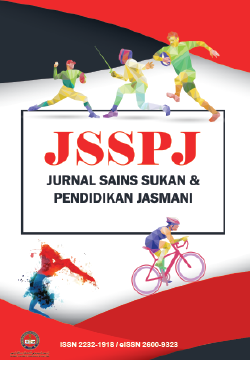Digital Footprints and Mental Resilience: A Study of Social Media's Influence on Student Athletes
DOI:
https://doi.org/10.37134/jsspj.vol12.2.3.2023Keywords:
Digital Footprints, Mental Resilience, Social Media, Student AthletesAbstract
Scholars are increasingly exploring the psychological and emotional effects of social media on mental well-being, making it a growing research area. Limited empirical studies exist that specifically examine how athletes balance academic demands and engage with social media platforms in their pursuits. This study intends to determine the social media platforms favored by student-athletes and the amount of time they dedicate to them. Additionally, this study seeks to uncover the attitudes of student-athletes while participating in social media and explore the connection between social media use and self-esteem in this group. A purposive sampling approach was used to target individuals with prior involvement in the student sports carnival or "Karnival Sukan Mahasiswa." The survey was administered via an online platform utilizing Google Forms. In this study, the Social Media Use Integration Scale (SMUIS) by Jenkins-Guarnieri et al. (2013) and the Rosenberg Self-Esteem Scale (RSES) were utilized to assess the self-esteem of student-athletes. The findings indicated that TikTok (60%) was the most frequently used daily social networking site among student-athletes, followed by YouTube (53%) and Instagram (43.5%). Moreover, the findings highlighted that while social media platforms offer chances for networking, self-expression, and advocacy can also contribute to stress and mental pressure. In conclusion, social media's influence on student-athletes has dual facets where it enables networking and self-expression, yet also potentially causing stress. Further exploration is needed to comprehend its complexities, emphasizing lasting psychological effects and improved strategies.
Downloads
References
Aina, N., Omar, S., Sazali, R., Mim, N., & Zainuddin, N. (2023). Understanding the motivation factors towards sports performance within the scope of collegiate athletes. Journal of Contemporary Social Science and Education Studies (JOCSSES), 3(1), 73–79. http://jocss.com/index.php/multidiscipline/article/view/147
Fardouly, J., Willburger, B. K., & Vartanian, L. R. (2018). Instagram use and young women’s body image concerns and self-objectification: Testing mediational pathways. New Media & Society, 20(4), 1380-1395. https://doi.org/10.1177/1461444817694499
Filo, K., Lock, D., & Karg, A. (2015). Sport and social media research: A review. Sport Management Review, 18(2), 166–181. https://doi.org/10.1016/J.SMR.2014.11.001
Hair, J. F., Celsi, M., Money, A., Samouel, P., & Page, M. (2015). The essentials of business research methods: Third Edition. The Essentials of Business Research Methods, 1–494. https://doi.org/10.4324/9781315716862
Hambrick, M. E., Simmons, J. M., Greenhalgh, G. P., & Greenwell, T. C. (2010). Understanding professional athletes’ use of Twitter: A content analysis of athlete tweets. International Journal of Sport Communication, 3(4), 454-471. https://doi.org/10.1123/ijsc.3.4.454
Jenkins-Guarnieri, M. A., Wright, S. L., & Johnson, B. (2013). Development and validation of a social media use integration scale. Psychology of Popular Media Culture, 2(1), 38–50. https://doi.org/10.1037/A0030277
Jozani, M., Ayaburi, E., Ko, M., & Choo, K. K. R. (2020). Privacy concerns and benefits of engagement with social media-enabled apps: A privacy calculus perspective. Computers in Human Behavior, 107. https://doi.org/10.1016/J.CHB.2020.106260
Kim, B., & Kim, Y. (2019). Growing as social beings: How social media use for college sports is associated with college students’ group identity and collective self-esteem. Computers in Human Behavior, 97, 241–249. https://doi.org/10.1016/J.CHB.2019.03.016
Nabiryo, A. (2023). The impact of social media use on the self-esteem of young teenagers and youth in Uganda (A case study in Bulenga, Kampala). http://dissertations.mak.ac.ug/handle/20.500.12281/16280
Orben, A., Dienlin, T., & Przybylski, A. K. (2019). Social media’s enduring effect on adolescent life satisfaction. Proceedings of the National Academy of Sciences, 116(21), 10226–10228. https://doi.org/10.1073/PNAS.1902058116
Park, J., Williams, A., & Son, S. (2020). Social Media as a Personal Branding Tool: A Qualitative Study of Student-Athletes’ Perceptions and Behaviors. Journal of Athlete Development and Experience, 2(1). https://doi.org/10.25035/JADE.02.01.04
Plackett, R., Sheringham, J., & Dykxhoorn, J. (2022). The longitudinal impact of social media use on adolescent mental health in the UK. The European Journal of Public Health, 32(Suppl 3). https://doi.org/10.1093/EURPUB/CKAC129.054
Rosenberg, M. (1965). Rosenberg self-esteem scale (RSE). Acceptance and commitment therapy. Measures Package, 61(52), 18.
Ruiz, R. M., Alfonso-Fuertes, I., & Vives, S. G. (2022). Impact of social media on self-esteem and body image among young adults. European Psychiatry, 65(Suppl 1), S585. https://doi.org/10.1192/J.EURPSY.2022.1499
Wagstaff, C. R. D., Sarkar, M., Davidson, C., & Fletcher, D. (2016). Resilience in sport: a critical review of psychological processes, sociocultural influences, and organizational dynamics. The Organizational Psychology of Sport, 138–168. https://doi.org/10.4324/9781315666532-17
Zainuddin, N. A., Ravichandran, V., Abd Rahman, R., & Md Yusof, Z. (2022). The Influence of Social Media on University Students’ Self-Esteem. Pertanika J. Soc. Sci. & Hum, 30(3), 1037–1048. https://doi.org/10.47836/pjssh.30.3.06
Zhigang, W., Kai, G., Chao, W., Hongyan, D., Lei, Z., & Zhao, X. (2022). How can social needs impact on meaningful sports consumption? Frontiers in Psychology, 13, 1043080. https://doi.org/10.3389/FPSYG.2022.1043080/BIBTEX
Downloads
Published
Issue
Section
License
Copyright (c) 2023 Nurfarzana Aliah Noor Apandi, Razif Sazali, Wan Normila Mohamad

This work is licensed under a Creative Commons Attribution-NonCommercial-ShareAlike 4.0 International License.





